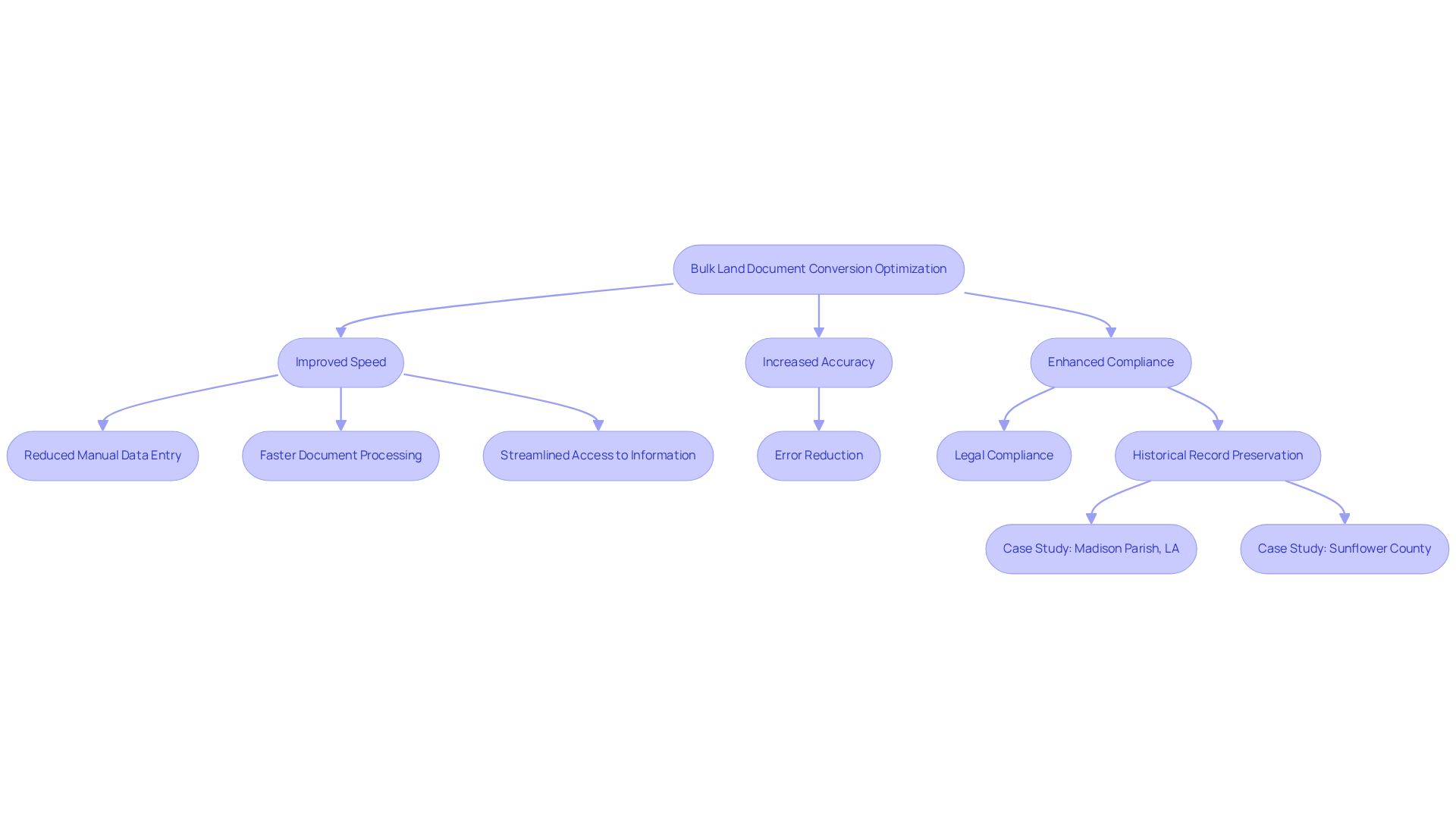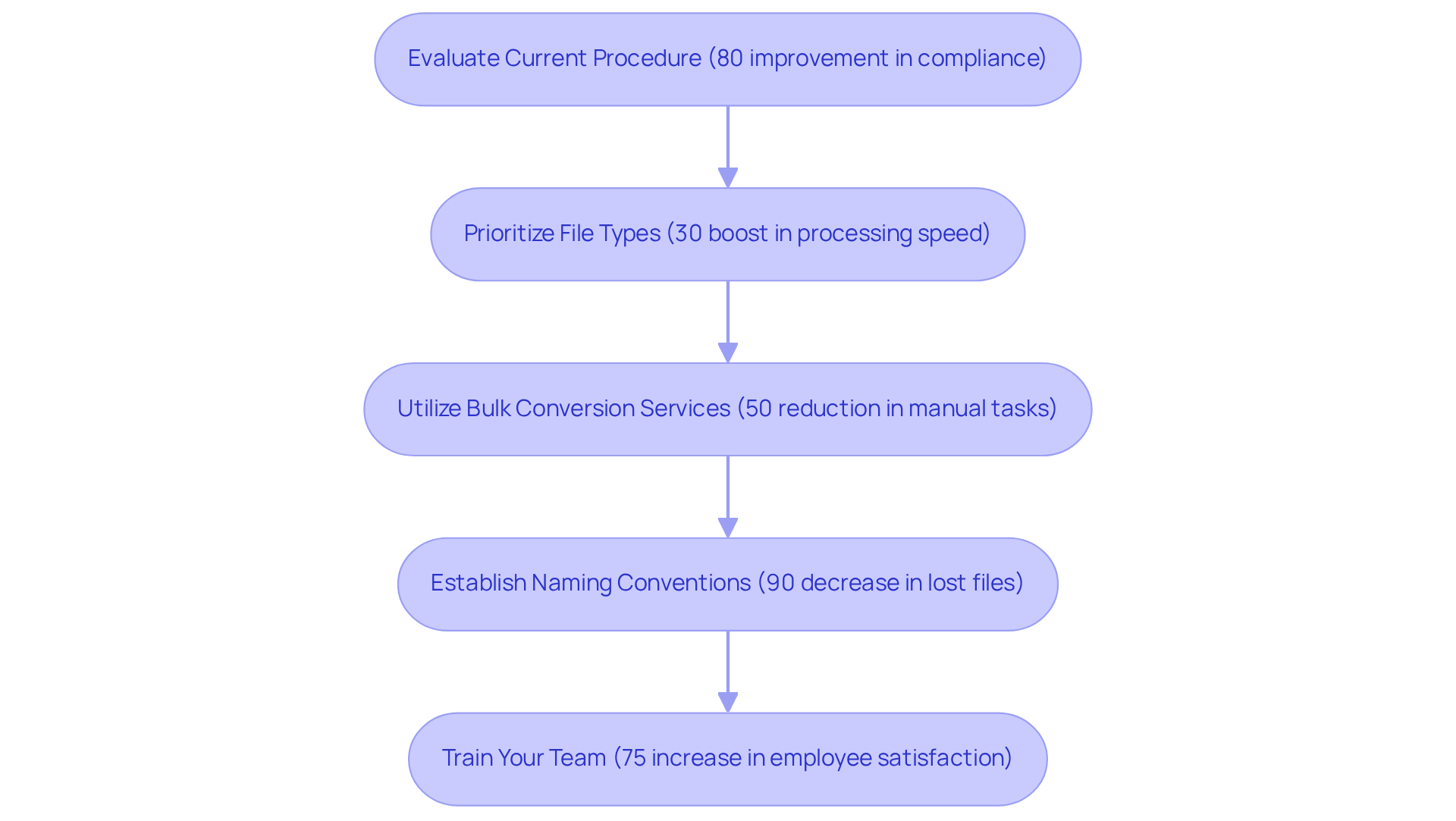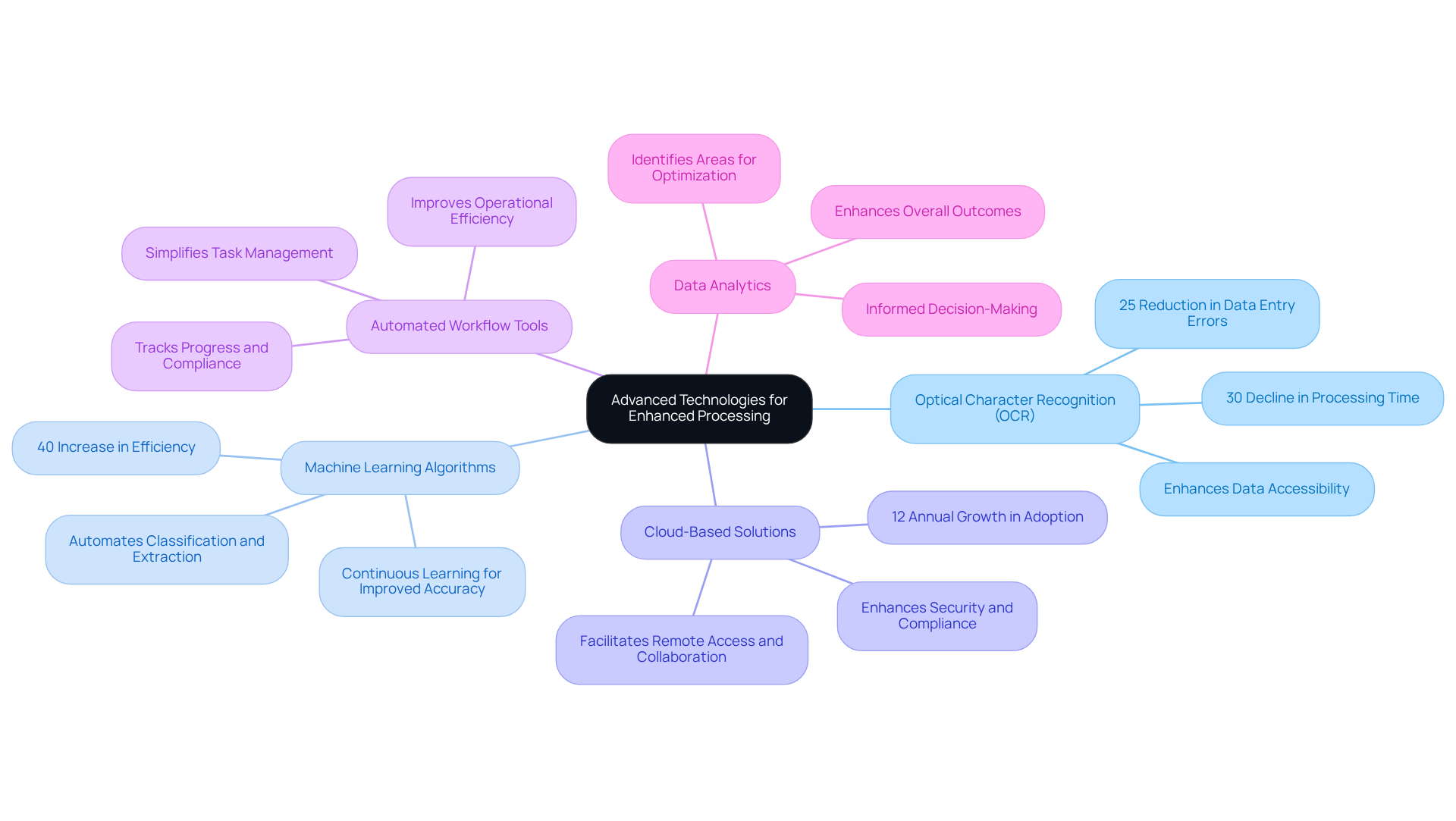Overview
This article emphasizes the critical importance of optimizing bulk land document conversion services to enhance title research, particularly through the improvement of speed and accuracy in property ownership verification. It addresses the challenges inherent in this process and introduces effective strategies, such as leveraging advanced technologies like Optical Character Recognition (OCR) and machine learning. These technologies streamline the conversion process, significantly reducing errors and processing times, which ultimately enhances overall workflow efficiency.
Introduction
In the realm of title research, the efficiency of property ownership verification is fundamentally tied to the optimization of document conversion services. By transforming physical files into digital formats, title researchers unlock faster access to critical information, significantly enhancing both accuracy and productivity.
However, as the demand for speed and precision escalates, organizations face the pressing question: how can they effectively navigate the complexities of document conversion to ensure compliance and minimize errors?
This article explores essential strategies and advanced technologies poised to revolutionize the document conversion process, paving the way for a more streamlined and effective title research workflow.
Understand the Importance of Document Conversion Optimization
Optimizing bulk land document conversion services is crucial for title research, significantly impacting the speed and accuracy of property ownership verification. By using bulk land document conversion services to convert physical files into digital formats, title researchers can swiftly access, search, and analyze essential information, resulting in a more effective workflow. This optimization not only reduces the time spent on manual data entry but also minimizes errors typically associated with traditional methods, which is particularly beneficial for bulk land document conversion services.
For instance, an engineering company that implemented Intelligent Document Processing (IDP) reduced its RFP response time from three weeks to just one week, showcasing the potential for enhanced productivity. Furthermore, IDP can cut processing time for files by over 50%, highlighting substantial efficiency improvements linked to file optimization. Improved file transformation, facilitated by bulk land document conversion services, also ensures compliance with legal requirements, which is vital for maintaining the integrity of real estate transactions.
The digitization of historical land records, as demonstrated in Madison Parish, LA, where mortgage records were scanned and indexed dating back to 1982, exemplifies how such initiatives can streamline property ownership verification processes. Additionally, the ongoing digitization initiative in Sunflower County, aimed at preserving nearly fifty years of historical land records, underscores the growing trend and importance of bulk land document conversion services in the sector. Recognizing the significance of file transformation optimization is essential for implementing effective strategies that enhance the title research process.

Implement Key Strategies for Efficient Document Conversion
To implement efficient document conversion, consider the following strategies:
-
Evaluate Your Current Procedure: Start by examining your existing file transformation process. Identify bottlenecks and areas for improvement, as organizations that regularly audit their workflows can achieve significant efficiency gains. In fact, a focus on better tracking and auditing can lead to an 80% improvement in compliance.
-
Prioritize File Types: Determine which files are most critical for conversion based on their frequency of use and significance in title research. Concentrating on high-volume, crucial materials initially can result in a 30% boost in processing speed and a significant decrease in mistakes. A global financial company experienced this advantage by automating their workflow processes.
-
Utilize bulk land document conversion services: Instead of converting files individually, employ bulk land document conversion services to manage several files at once. This method not only saves time but also ensures consistency in formatting, leading to a 50% reduction in manual tasks.
-
Establish Clear Naming Conventions: Implement a standardized naming system for digital files to enhance organization and retrieval. This practice streamlines the search process and minimizes confusion, leading to a 90% decrease in lost or misplaced files through centralized storage.
-
Train Your Team: Ensure that all team members are well-trained on the file transformation tools and procedures. An informed team can greatly enhance the efficiency of the transformation workflow, resulting in a 75% rise in employee satisfaction reported after automating workflows. Remember, automation is not a one-time project; it evolves with your business, and continuous training is essential for adapting to new tools and processes.

Leverage Advanced Technologies for Enhanced Processing
To optimize document conversion processing in title research, the use of bulk land document conversion services integrated with advanced technologies is essential.
-
Optical Character Recognition (OCR): Implementing OCR technology transforms scanned files into editable and searchable text. This method significantly reduces manual data input, resulting in a reported 30% decline in processing time and a 25% drop in data entry mistakes across various sectors, as noted by Forbes.
-
Machine Learning Algorithms: Utilizing machine learning algorithms automates the classification and extraction of relevant information from files. These algorithms continuously learn from past transformations, enhancing their accuracy over time. Organizations that have adopted machine learning in file processing report improvements in classification accuracy, with some noting an impressive 40% rise in efficiency.
-
Cloud-Based Solutions: Employing cloud-based file transformation services facilitates remote access and collaboration among team members. These bulk land document conversion services not only provide scalability but also enhance security, ensuring compliance with data protection regulations. The adoption of cloud technologies in Intelligent Document Processing (IDP) solutions is projected to grow by 12% annually, reflecting their increasing relevance in the industry.
-
Automated Workflow Tools: Incorporating automated workflow tools simplifies the file transformation process. These tools facilitate task management, track progress, and ensure adherence to legal requirements, ultimately improving operational efficiency.
-
Data Analytics: Utilizing data analytics allows organizations to assess the efficiency of their document transformation processes. By analyzing conversion metrics, businesses can identify areas for further optimization through bulk land document conversion services, leading to more informed decision-making and improved outcomes in title research. The broader economic implications of AI adoption suggest substantial improvements in efficiency and output as organizations integrate these technologies, as highlighted by industry experts.

Conclusion
Optimizing bulk land document conversion services is essential for enhancing title research efficiency and accuracy. Transitioning from physical to digital formats allows title researchers to access critical information swiftly, streamlining workflows and minimizing the risk of errors. This transformation not only accelerates property ownership verification but also ensures compliance with legal standards, ultimately preserving the integrity of real estate transactions.
The article highlights key strategies for effective document conversion. These strategies include:
- Evaluating current procedures
- Prioritizing file types
- Utilizing bulk conversion services
- Establishing clear naming conventions
- Training teams on advanced tools
Additionally, integrating technologies such as Optical Character Recognition (OCR), machine learning, and cloud-based solutions significantly enhances processing efficiency, leading to marked improvements in productivity and accuracy.
The significance of optimized document conversion extends beyond mere efficiency; it fundamentally shapes the future of title research and real estate management. As organizations adopt these strategies and technologies, the potential for enhanced accuracy, reduced processing times, and improved collaboration becomes increasingly attainable. Embracing these practices is not merely a step towards modernization; it is a critical move towards ensuring the reliability and integrity of property records in an ever-evolving digital landscape.
Frequently Asked Questions
Why is document conversion optimization important for title research?
Document conversion optimization is crucial for title research as it significantly impacts the speed and accuracy of property ownership verification, allowing title researchers to swiftly access, search, and analyze essential information.
How do bulk land document conversion services improve workflow?
Bulk land document conversion services improve workflow by converting physical files into digital formats, reducing the time spent on manual data entry and minimizing errors typically associated with traditional methods.
What is Intelligent Document Processing (IDP) and how does it enhance productivity?
Intelligent Document Processing (IDP) is a technology that automates the processing of documents. An example of its impact is an engineering company that reduced its RFP response time from three weeks to one week, showcasing enhanced productivity.
How much can IDP cut processing time for files?
IDP can cut processing time for files by over 50%, highlighting substantial efficiency improvements linked to file optimization.
What role does document conversion play in legal compliance?
Improved file transformation through document conversion ensures compliance with legal requirements, which is vital for maintaining the integrity of real estate transactions.
Can you provide an example of successful digitization of land records?
An example is Madison Parish, LA, where mortgage records dating back to 1982 were scanned and indexed, streamlining property ownership verification processes.
What is the significance of the digitization initiative in Sunflower County?
The ongoing digitization initiative in Sunflower County aims to preserve nearly fifty years of historical land records, underscoring the growing trend and importance of bulk land document conversion services in the sector.
Why is recognizing the significance of file transformation optimization essential?
Recognizing the significance of file transformation optimization is essential for implementing effective strategies that enhance the title research process.




